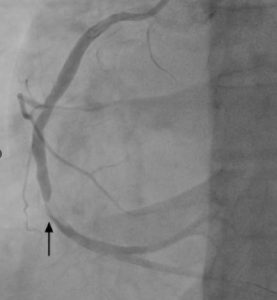
Victoria Boudreau, 53, of Manchester was at the right place, at the right time – UConn Health– while working as a newly hired office assistant in Patient Access/Revenue Cycle – when she started to have heart attack symptoms.
“I didn’t feel good that day, but just kept going through my workday like a million times before,” Boudreau shared. “I thought maybe I was just tired or didn’t drink enough water. But then I felt like I was continuously getting hot flashes.”
It turns out her heart was trying to tell her something. And it’s a good thing Boudreau listened to her heart.
“I then wasn’t fine. I felt very weird. I thought about driving home but knew I couldn’t even physically make it to my car,” said Boudreau. “I talked to my supervisor and told her I don’t feel good, I think I need an ambulance. My hot flashes wouldn’t go away. I needed to go to the Emergency Department. Something was very wrong. My work colleagues called for help.”
Patient Access Coordinator Barbara Lucente was the fellow employee who made the call to 9-1-1. “I would like to give Barbara Lucente all the credit for her special lifesaving role!” says Boudreau’s supervisor Beth DeFilippis at UConn Health.
Boudreau felt nauseous, was sweating even on the cold, rainy spring day of May 1, 2022, and along with her hot flashes she was feeling an unusual jolting sensation in her chest that she never ever felt before.
From her UConn Health campus Munson Road building work location, a UConn Health ambulance arrived and whisked her to the UConn John Dempsey Hospital Emergency Department.
“Something is happening to me,” she recalls telling the UConn Health nurse triaging her. “My first EKG was normal, but then in the midst of it, while the EKG leads were still attached to me, the jolts in my chest started happening again! My heart attack was all caught on the EKG.”
The EKG showed that Boudreau was having a dangerous ST-elevated myocardial infarction or STEMI heart attack caused by her heart artery being severely blocked and limiting blood flow to her heart muscle. For this type of heart attack, it is critically important for heart blood flow to be restored quickly by opening the artery blockage rapidly to prevent heart muscle damage and potentially death.
She recalls her Emergency Medicine physician telling her that he was so glad she was at work at UConn Health while having the STEMI heart attack. She recalls him saying “you may not have made it to the hospital in time. Your heart could have stopped.”

Just minutes after her heart attack, Interventional Cardiologist Dr. Peter F. Robinson took her emergently from the ED to the UConn Health Pat and Jim Calhoun Cardiology Center’s Cardiac Catheterization Laboratory to perform a minimally invasive cardiac catheterization procedure, all through her wrist artery, to deploy a cardiac stent in her heart to successfully open the artery blockage. UConn Health is known for its longtime, pioneering leadership in this wrist technique called radial artery access angioplasty.
“The whole experience at UConn Health was just amazing,” says Boudreau. “They always say everything happens for a reason. I am so glad I went to work that day, asked my supervisor for help, and chose to quickly go the UConn Health ED for care.”
Looking back, Boudreau wishes she followed her primary care doctor’s prior suggestion to start taking a statin cholesterol-lowering medication sooner before having a heart attack since annual blood draws flagged that her cholesterol was becoming elevated.
“I should have listened to my primary care doctor sooner,” she stresses as high cholesterol is a risk factor for developing heart disease and a predictor of possibly having a future heart attack if not controlled.
Her message to others: “When your doctor suggests medications, please take it! I wish I had listened. I don’t want to have another heart attack and I am now being proactive with my heart health.”
Following her heart attack survival, Boudreau now takes a daily statin to keep her cholesterol in check, and an additional cholesterol-lowering medication injection monthly to reach her optimal cholesterol goal.
She also has conquered a major accomplishment to additionally lower her future heart attack risk: “I quit smoking!”
“My heart attack was scary. I never thought a heart attack would ever happen to me!” Boudreau says. “But a heart attack can happen to you. It happened to me at my young age and it was a reality check for me.”
And as a UConn Health employee, and now a heart patient, Boudreau is extra grateful for UConn. She celebrates her one-year of employment at UConn Health on Valentine’s Day, February 14.
“I was treated like royalty at UConn John Dempsey Hospital,” she shares. “My heart attack care was great. My UConn Health colleagues who helped care for me were all grateful I was there for care, and acted on my heart attack symptoms, and didn’t wait to seek care or drive home. The Emergency Department and the Cath Lab was amazing.”
Dr. Supriya Tigadi, was her treating cardiologist at UConn John Dempsey Hospital that day and now remains her heart doctor. Boudreau says she “really listens.”
“Prevention of heart disease and heart attack is critical. We should start to focus at a young age,” says Tigadi. “Heart disease is becoming more prevalent among women and is now the number one cause of death. But early lifestyle changes accompanied with medications for cholesterol when appropriate can help prevent heart disease and heart attack.”
Tigadi, and Boudreau, both have a strong reminder to both men and women everywhere this Heart Month to always do one thing:
“Listen to your heart!” they both say.
And don’t ever ignore or delay emergency care for these heart attack warning signs:
- Sudden chest pain, heaviness, or tightness/squeezing
- Shortness of breath
- Sweating or lightheadedness
- Dizziness
- Nausea
- Indigestion, heartburn, or an esophageal burning sensation.
Boudreau concludes: “I am so thankful to UConn Health for my really positive outcome!”
7 tips to prevent cardiovascular disease include:
- Do not smoke.
- Keep a healthy body mass index (BMI should be less than 25).
- Be physically active (Moderate exercise should occur 3-5 days a week even if just 30-40 minutes of brisk walking).
- Maintain an optimal diet.
- Control your total cholesterol (Less than 200 is ideal).
- Control your blood glucose (To prevent or manage diabetes a fasting glucose level of less than 100 is ideal).
- Control your blood pressure (Less than 120/80).



